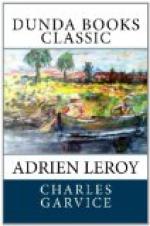A few minutes later the servant brought her the hastily written note. It was only a scrap of paper, and unfolding it, she read the two lines:
“My father grants us the ball. We will make it an eventful one.—ADRIEN.”
Her face glowed. “We will, indeed,” she murmured. “It is a high stake I play for; but it is worth the struggle. Heaven grant me his whole heart! I ask nothing else.”
Carefully locking the scrap of paper away, she descended into the morning-room, where Lord Barminster was already seated at the breakfast-table. His grim face softened at the entry of the girl he had always looked upon as a daughter, and loved even more intensely—if that were possible—now that he meant to win her for his son’s bride.
“So Adrien has left us again?” he began, as she poured out his coffee.
She flushed slightly at his significant tones.
“Yes,” she replied. “Uncle, thank you so much for letting us have the ball——”
“Nonsense, my dear” he returned. “Adrien told me you wanted it, and that was sufficient. Why didn’t you ask me yourself? Have I been such a cruel guardian?”
“No, no,” she cried, and coming round to him impulsively, she pressed her lips to his forehead. “You’ve been the dearest uncle in the world. Indeed, no father could have been better.”
He smiled at her earnestness.
“I’ve done my best, my dear, though I admit I’d like you for my very own daughter-in-law.”
Lady Constance blushed scarlet. This was carrying the war into the enemy’s camp with a vengeance.
“‘Nobody axed me, sir, she said,’” she sang gaily.
“Ah, but whose fault is that?” asked Lord Barminster, pleased that she had not refused to discuss the question.
“Please, Uncle Philip,” she said, with a sudden quiver in her voice, “I’d rather not talk about it—if you don’t mind.”
“Quite right, my dear,” replied Lord Barminster, patting her hand reassuringly.
For a few minutes there was silence. His lordship drank his coffee, while his companion stared dreamily through the window at the magnificent view of park and woods. The old man was the first to speak.
“We shall miss Lord Standon,” he said, with a meaning glance at her.
Lady Constance looked up with a start; then, as she realised the significance of this simple statement, she smiled. She knew she could trust her uncle not to betray her woman’s secret; and, though she had no scruple in using Lord Standon as a means to spur on Adrien, she would not allow the old man to be worried unnecessarily by doubts of her fidelity to his beloved son.
“Yes,” she answered, quietly. “But he only came down for the race; and I daresay he was anxious to rejoin his fiancee.”
It was her uncle’s turn to start, and his intense surprise told Lady Constance only too well that her speculations were correct. Adrien had believed her in love with Lord Standon, and his father had undertaken to find out the truth. She was not afraid of Adrien’s being undeceived now; for, even if Lord Barminster wrote—which was very unlikely—the spur would have done its work.




